If you own closed-end funds (CEFs), I have great news: equity CEFs are doing exactly what we want them to: crushing the market while handing us 7%+ dividends.
(And if you’re not yet in CEFs, or want to bulk up your CEF holdings, sit tight: I’ll name a fund you can buy shortly. It has an extra kick in store, thanks to an over-torqued corporate failure: I’m looking at you, WeWork.)
First, here’s what stocks have done this year:
Stocks Soar …
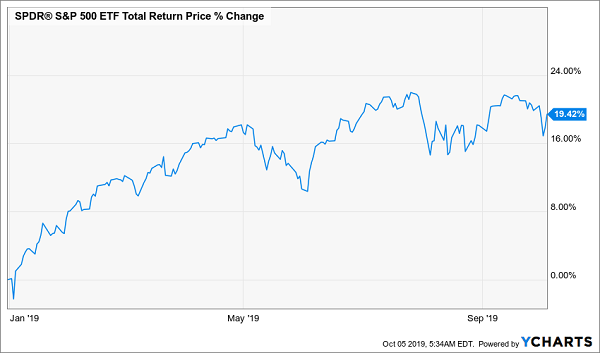
And here’s what CEFs are up to (with the beige line at the top being the equity CEFs tracked by my CEF Insider service).
… But Equity CEFs Skyrocket (with 7%+ dividends)
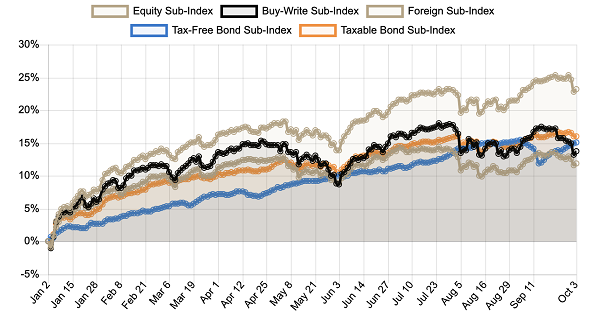
Source: CEF Insider
That’s a 23%+ gain! And it includes an average dividend yield four times higher than what the S&P 500 pays. If we go just a little bit deeper, we arrive at one corner of the CEF world (and one fund) that’s primed for yet another gap higher.
Real Estate: 50% Gains Are Only Act 1

The five best-performing CEFs in 2019 have one thing in common (besides being up 50% year to date, on average): they all hold American real estate, specifically high-yielding real estate investment trusts (REITs).
REITs are soaring this year, for good reason: as industry analysts NAREIT noted in early 2019, capitalization rates (or the ratio of the income a property generates compared to that property’s value) were quietly rising as growing consumer spending drove companies to rent more real estate.
Of course, none of this means we’ll see an end to panicky headlines about real estate, and any negative news would nicely set us up to buy REITs—specifically REIT-focused CEFs—on dips.
Doing so is always a smart move, because REITs, shown below by the SPDR Dow Jones REIT ETF (NYSE:RWR), in orange, have crushed the market over the last 20 years.
REITs Reward Investors—Especially on the Dips
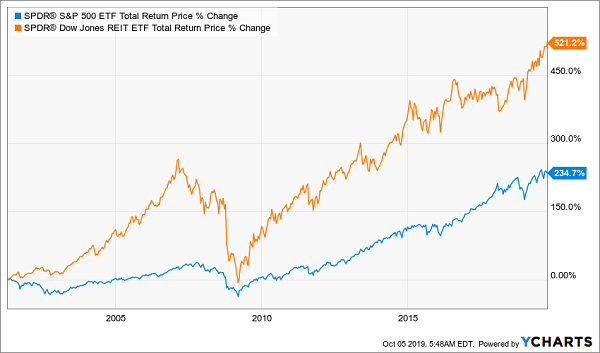
Now let’s get even more granular, with a specific REIT CEF to put on your watch list now, and the overhyped corporate collapse that could drive it to a double-digit gain.
That would be the Cohen & Steers Quality Income Realty Fund Inc (NYSE:RQI), which is up 59% year-to-date and gets us hundreds of REITs in one fund, from cell-tower landlord American Tower (NYSE:AMT) to warehouse operator Prologis Inc (NYSE:PLD). RQI pays a 6.1% dividend yield that’s set to rise, since the payout is a small fraction of RQI’s total gains.
And then there’s this:
Real Estate? Stocks? Doesn’t Matter, RQI Beats It
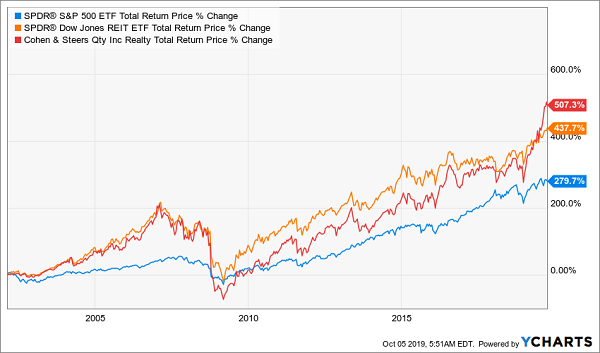
Not only has RQI (in red above) crushed the S&P 500 through its history, but it’s also beaten the REIT index fund by a massive 70 percentage points. That makes RQI one of the best funds to buy whenever the market freaks out over non-events. And its next freakout may be just around the corner.
This Crumbling Startup Could Give Us Our In
If you’ve been following the world of startups, you’ve probably heard about the latest IPO disaster: the fall of WeWork.
WeWork is a co-working juggernaut that rents out space to freelancers and small businesses. It’s spent billions to fuel its growth, has expanded internationally and is backed by the $100-billion Softbank Vision fund.
When the WeWork IPO recently collapsed due to its overpriced valuation of $47 billion, it seemed increasingly likely that the company would downsize, or maybe go bankrupt.
Here’s where this ties into REITs: WeWork has signed multi-year lease agreements with offices around the world. If it breaks those leases, the high-profile nature of this failure could result in a REIT selloff.
And that would be a terrific buying opportunity, because while WeWork is big for the co-working market, at 6.5 million square feet, there’s 87 billion square feet of office space in the US. So a WeWork failure would affect just 0.007% of the total.
Of course, headline-driven first-level investors wouldn’t take the time to find that out, and would likely be quick to sell any REITs on the news. That would give us a perfect chance to jump in and grab some upside—and inflated dividend yields, too.
4 Big 8.8% Dividends to Grab as WeWork Implodes
Don’t worry, we’re not going to sit on our hands and wait for WeWork’s demise to grab ourselves some nice 6%+ yields (and upside).
We’re going to jump in now and start tapping an even bigger dividend (I’m talking a massive 8.8% yield) and big price gains—to the tune of 20%+ upside in the next year!
We’re going to do it with the 4 incredible funds I’m recommending to my paying CEF Insider subscribers now.
These 4 income plays hand you that 8.8% average payout I just mentioned. Some pay even more, like Pick No. 4, which throws off an amazing 10.7% dividend now. Its team of pros (which, by the way, charge one of the lowest management fees in CEFs) has dominated the market:
These Managers Work Cheap—and Pay You 10.7%
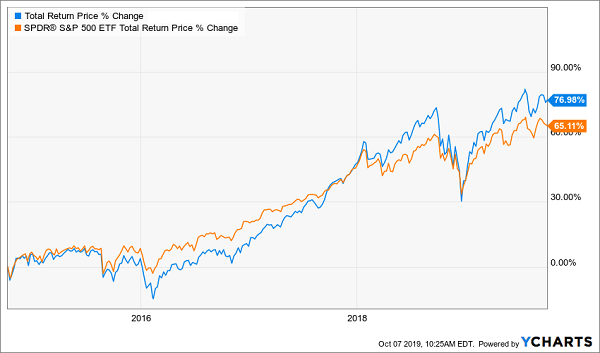
The kicker? This retirement-changing fund comes to you at a ridiculous discount, setting us up for even more upside—and fast.
Disclosure: Brett Owens and Michael Foster are contrarian income investors who look for undervalued stocks/funds across the U.S. markets. Click here to learn how to profit from their strategies in the latest report, "7 Great Dividend Growth Stocks for a Secure Retirement."
